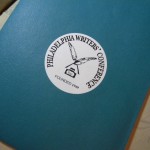 Every year, after the dust of the Philadelphia Writers’ Conference has settled, I look back and see what my biggest takeaway is. After all, it’s good to see what you’re getting out of any experience so you can judge your return on investment. In past years, my takeaways have included a lessening of my pitching panic and a creative awakening.
Every year, after the dust of the Philadelphia Writers’ Conference has settled, I look back and see what my biggest takeaway is. After all, it’s good to see what you’re getting out of any experience so you can judge your return on investment. In past years, my takeaways have included a lessening of my pitching panic and a creative awakening.
This year, I met a lot of people, including some I only knew from social media. That’s always fun, to finally meet someone in real life! I didn’t get to spend as much time chatting with them as I would have liked, but it was nice to put a voice with the face. Now I can read their posts and hear their voices.
Even on my limited budget, I managed to buy a few books which now reside in my To-Be-Read pile—in line right after the library books. I bought one craft book and one fiction book, and I’m still deciding which to read first.
And of course I learned a lot. All those workshops…my head was spinning by the end of each day! I really enjoy learning how different authors approach the various stages of writing, from brainstorming to editing. Sometimes I pick up a tip that resonates with me, and other times I know immediately that their process would never work for me. But I still like learning about it so I can refine my process.
This year, the one idea that my brain keeps circling back to is from Fran Wilde’s Short Story class. She spoke about raising the stakes and said that your character should be in more danger BECAUSE they fulfill their need. In other words, fulfilling Need A allows them to go after Need B, which is harder and more dangerous than Need A. Getting Need B kicks them up to the even more difficult Need C, and so on.
I had never thought of it like that before.
I knew, of course, that your stakes have to consistently raise throughout a story. But I always thought of it as somehow a random thing. For instance, “Okay, my hero achieved something, but now I need something harder than that. All right, send in zombie unicorns.” I think I thought of the new threats, the higher stakes, as coming from external forces not necessarily tied to the inner stakes, although I knew they had to raise as well.
This idea of stepping-stone stakes tied intimately to fulfillment of the hero’s needs intrigues me. Fran was talking about short stories, but I can see how this would work as well for novels. By arranging the hero’s needs in a hierarchy and then starting with his most basic need and working his way up, there is a natural build to the stakes. And the tight cause-and-effect structure makes for a more solid story overall.
I’m in the middle of a massive revision right now, and once I’m done this phase I will go back and look at my stakes in light of this new understanding.
So my biggest takeaway this year was a structural revelation. What was your biggest takeaway?
